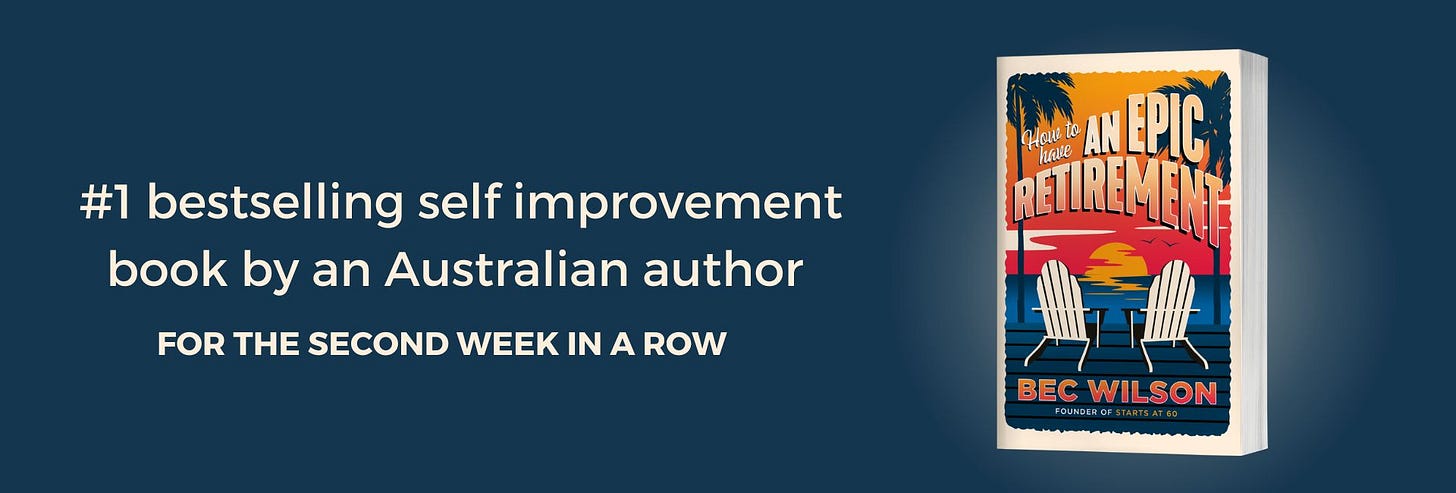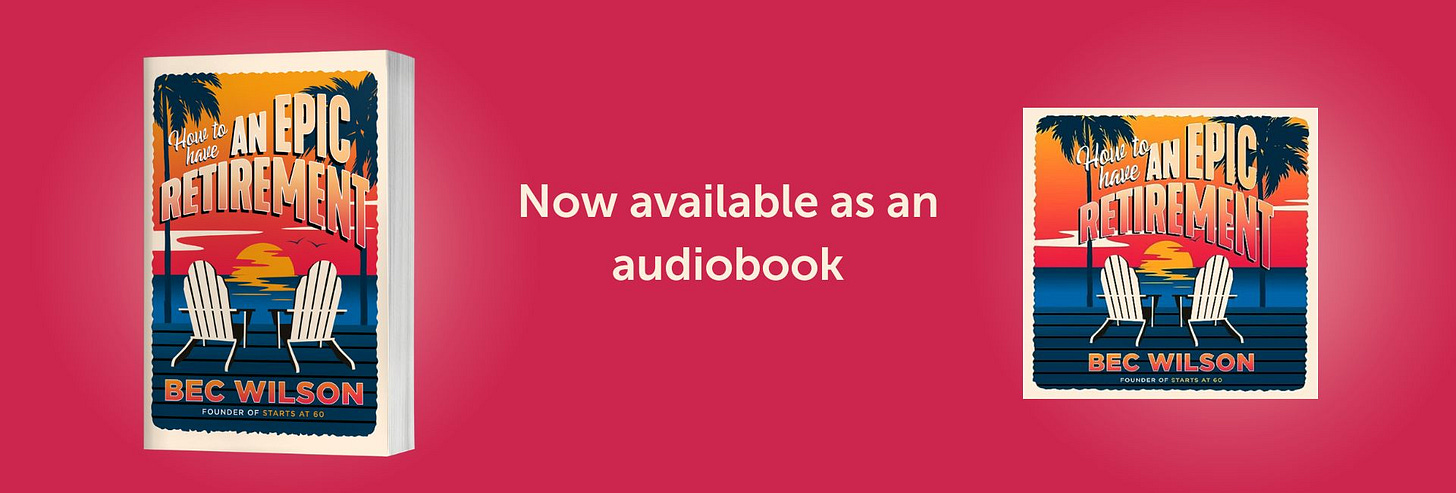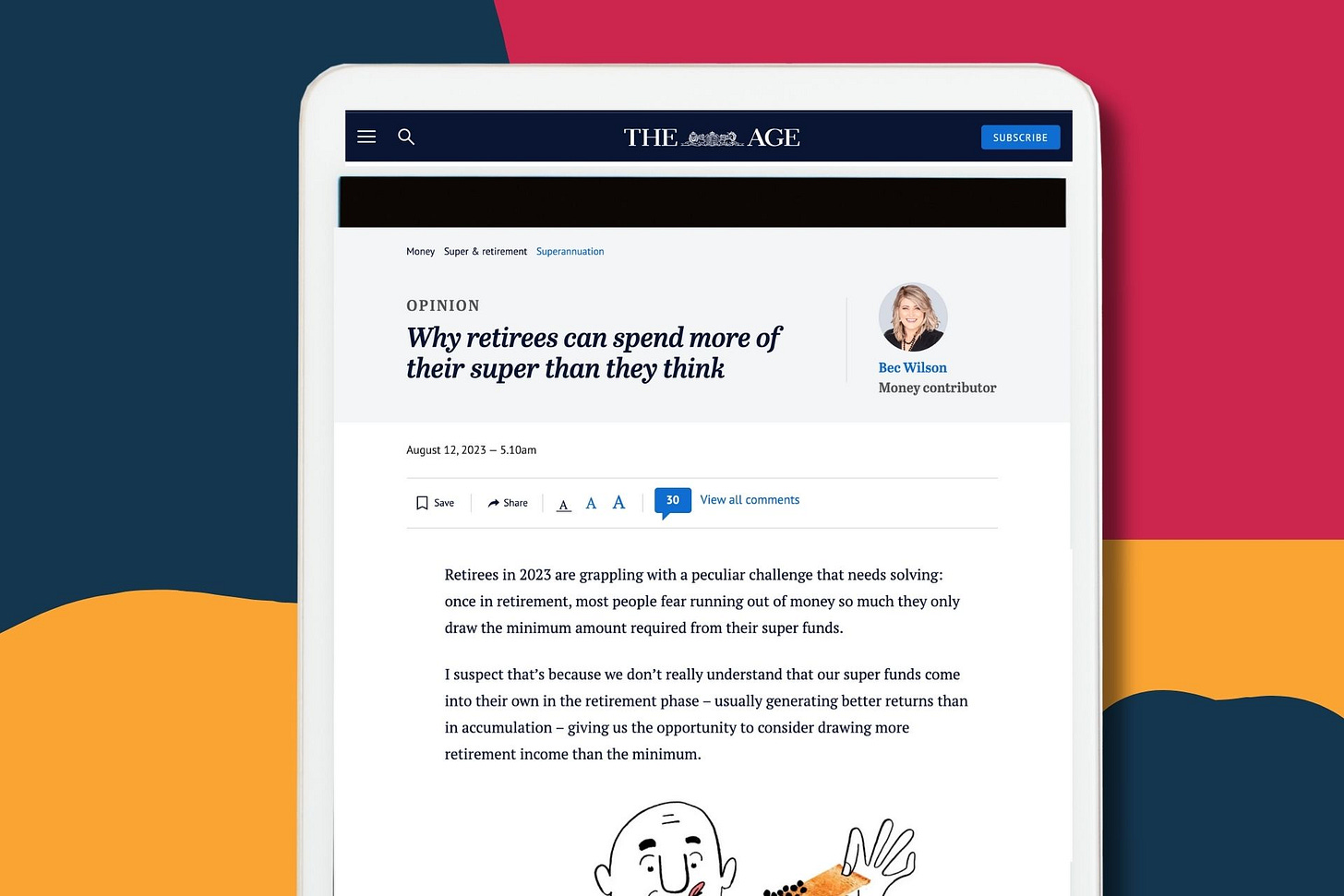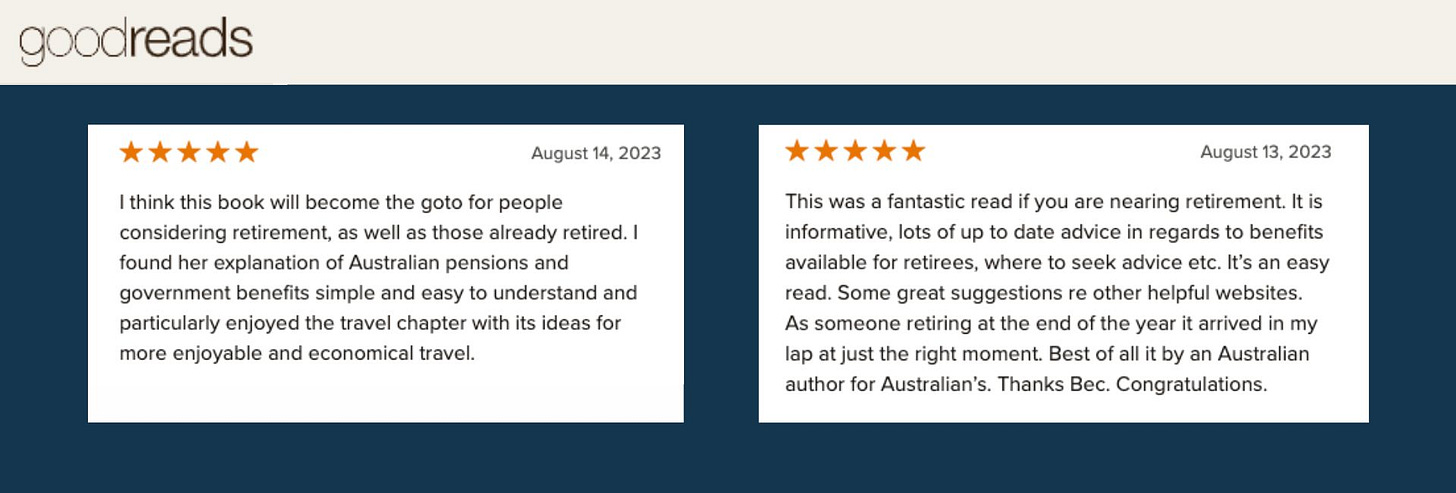Before you retire, we need to talk about your bank accounts, credit cards and home loan
Once you pay down your mortgage and lose your paycheque you become the most unappealing banking customer in the country. So to prepare for your retirement, I've got a list for you.
Welcome back for another week of the Epic Retirement Newsletter. I have just received the book sales stats for the week ending today and How to Have an Epic Retirement is in the top spot again for the second week! #1 bestselling self improvement book by an Australian Author FOR THE SECOND WEEK and #3 bestseller on the self improvement list nationally (incorporating international authors)!
In this newsletter you’ll find …
Article: We need to talk about bank accounts, credit cards and homeloans as you near retirement
‘From Bec’s Desk’ this week
Buy the book, audiobook or ebook
Article: Why retirees can spend more of their super than they think (SMH/Age)
Retirement Diaries Podcast: The #1 retirement bucket list holiday through Canada, Alaska and the USA with Suzanne Keir
Let’s dive in!
We need to talk about your bank accounts, credit cards and home loans as you near retirement
I’ve written a few articles in the major newspapers in recent weeks about some of the smart steps you might want to consider with your banking, credit cards and home loans as you approach retirement, but not everyone pays for newspapers, so today we’re diving in together here. It’s a big topic and I’m not going to be shy about it. We need to talk about how the big banking sector’s attitude toward those who are 55+ and don’t have a mortgage has changed, and how that is likely to affect you as you head into this next stage of life. I want you to prepare yourselves well.
Let’s start by busting a few myths and telling a few secrets. And there’s three big ones in my firing line today:
Many people feel compelled to pay down their mortgage as they approach retirement. I’m going to explain something that might have you reconsider paying it off in full.
Many people don’t understand how difficult it can be to get or upgrade a credit card when you no longer have a paycheque, even if they have hundreds of thousands, or even millions of dollars in the bank.
And finally, many also think that the bank they have had their mortgage and savings accounts with for previous decades is likely to offer them the best rates, and ongoing benefits for their loyalty, and look after them in their older age.
I’d like to argue that in the months or years before you retire, you might want to consider reviewing the way your banking should work for you in the next stage of life. Put any loyalty you might think you should have to your bank to one side, and be a little selfish. Assess whether you really are getting a good deal and think about what you need in the next phase of life. And don’t be afraid to switch.
Let me explain how things have changed
To give you a little perspective, let me explain how banking with the big four banks has changed over the last 10-15 years. Banks used to make money in a lot of different ways. They charged fees for holding your funds in transaction accounts and paid you very little interest, giving them a cheap deposit base. They then used this money to provide home loans to people buying houses and charged good interest on loans that generated them strong income over 25-30 years. They also used to run investment arms, which charged fees to manage money invested, but the music stopped on this four years back. And finally, they offered term deposits as another source of funds. Over some years, many of these sources of income for banks have dried up.
A big four’s bank’s primary business is now in lending money for profit and making returns for their shareholders (of which you might also be one so don’t knock it). They lend money to home buyers, most of whom have paid off their mortgages by the age of 55; and they lend money to businesses. And those loans provide the lion’s share of the bank’s margins. They have millions of shareholders relying on the dividends from their banks as income (particularly retirees) and banks don’t want to disappoint them. So that means they have to be really focussed on who they offer their services to, and at what margins they accept new business.
Why should you care?
Once you stop borrowing from the bank, particularly the big four banks which are currently focussed on lending customers, you become a less desirable customer - in fact you could become their most undesirable customer type. And no business chases a less desirable customer with the highest of high interest rates, great perk-packed credit cards, loyalty benefits or offers, do they? (remember - banks have to stay focussed these days!)
In addition to this, when you shift from getting a paycheque to drawing a retirement income, most banks struggle to recognise your income at all, even if you have hundreds of thousands or even millions of dollars in super, and draw a sizeable drawdown each month. And that means you may not be able to access new credit. No new credit cards, no increases to credit limits, no new loans or lines of credit should you need access to cash flow either. And you might not have thought about the ways that can affect you until it does.
It surprises me how loyal most people feel to their banks after using them for 20-30 years. A lot of people have actually got all the way to 50 or 55 with one bank, and feel extraordinarily devoted. What they don’t realise, often until it is too late, is that their loyalty is costing them real money and might leave them with additional challenges later in life.
I know, I know, it is a giant pain in the a**e to move banks. But when your mortgage is finally paid off, if you are still getting a paycheque, it can be a lot easier to switch than at any other time in life.
Now, let’s talk about the three big areas to take it personally
OK, so now you have a little background, let’s apply this changed environment to your own banking and the things you’ll likely need as you navigate retirement.
First I want you to think about your need for access to funds and banking perks, and contemplate whether you really should pay off your home loan in full
Many people think they should work really hard to reach the huge milestone of discharging their mortgage, and getting the papers in the mail to confirm it. And, they’re not wrong. Going into retirement owning your own home is certainly the most desirable situation to be in. BUT I want you to contemplate that the day you pay it off, you wont have access to that lumpy draw facility anymore. And, on that very day, you will become a less desirable banking customer. They will no longer offer you the bonus-special-offer-credit cards, and the clever-cash-back programs designed to lure in and retain home loan customers. What’s your alternative? You might want to consider paying your loan down to the last $10, and keeping it, understanding of course, that you might have to pay an annual or monthly fee.
Second, consider your credit cards, before you stop your paycheque
The next thing to think about is your credit cards. As I mentioned before, banks find it quite difficult to consider retirement income as a real income stream. So it can be very difficult to access a new credit card or have a credit card limit increased by one of the big 4 banks after you retire.
In addition to this, if you are a second card holder on your partner’s credit card and your partner dies, this can really stop you in your tracks. As the bank will probably not extend that credit anymore. And you might find it near impossible to get a credit card in your own name, particularly if you don’t have an existing credit rating and your income comes from - you guessed it, ‘retirement income streams’.
So what can you do? Take a proper look at your credit cards before you and your partner stop your paycheques for the last time. Think about how you should ‘future proof’ your credit card setup, so that if one of you dies, the other isn’t left without credit. But also think about whether your limits are where you need them for the convenience of life, doing online shopping, booking holidays and travelling. Even if you aren’t a big credit card user, it’s an important consideration BEFORE retirement.
Third, think about your bank accounts all over again
Banking is different to how it used to be. And you need to be able to spot the accounts that are right for you and chase the rates you deserve. So let me explain the way banks have shifted account offerings now.
Every person has a ‘transactional banking account’ the account through which you receive your income each month and pay your bills. Usually on the side of this you have a high interest savings account, and these differ, depending nowhere you are in life.
When you’re young and saving for a home loan the bank will offer perk-packed behavioural savings accounts, which reward you for meeting specific savings criteria (that is usually irrelevant in retirement). They pay a low base interest rate and a big incentive rate when you save money each month. And the banks use these to lure in future home buyers and promote their home loan offers. Then, once you get a home loan, every cent you have goes into your redraw, to offset your interest, the most efficient way to save. And then, when you’ve paid down your home and have a surplus of cash, you need to put it into an account that has as high an interest rate as you can. The big four banks aren’t focussed on these customers right now, so the second tier banks like ING, Bank of Queensland, AMP and Bendigo Bank are stepping up, offering very competitive high interest savings accounts without all the behavioural criteria.
—
The big four banks don’t appear to be worried at all about the smaller banks being more keen to bring you a better deal. In fact, many are so focussed on younger customers that they don’t mind if you switch. You’re not their future target market, you’re their past target market. So forget your loyalty and do what’s right for you, readying yourself to have an epic retirement.
From Bec’s Desk - a personal note
It’s been another exciting week. The stats for this week came in minutes ago, and the book sits for the SECOND WEEK, on the official book seller charts as #1 bestselling self improvement book by an Australian author, and there’s only two books ahead on that list by international authors. It’s a huge privilege to be here after just 3 weeks in market.
Yesterday we launched the audiobook format of How to Have an Epic Retirement so if you want to hear my melodic tones for 10 hours of retirement lessons, you now can! Audiobooks are great for busy people and those who don’t like to read. I read the book aloud myself, injecting a personal touch that only an author can I think. I hope you enjoy it. It too is available where all good audiobooks are sold (Audible, Angus & Robertson, Dymocks, and Booktopia).
And last night we sold out again on Amazon and Booktopia! More stock is already on its way to their warehouses! So it will probably be back in stock within hours or days.
I am loving getting your messages, photos and feedback on the book. It really buzzes me. So thank you and please keep it up. You can email me at bec@epicretirement.com.au with your photo and story. Or just post it on social and tag me! (Insta: @epicretirement; Facebook: @becwilsonepic, Linkedin: )
I’ve had another really fun week on radio shows and recording podcasts throughout Australia. Many thanks for all the wonderful calls and texts that come in when I’m on air. I love to talk retirement.
So, for the week ahead - Make it epic and thank you for all your support and cheering on! I just want every retiring Australian to better understand how they can have an epic retirement.
Bec Wilson Xx
Buy the book, audiobook or ebook
If you haven’t ordered your copy of How to Have an Epic Retirement already, here’s how you can.
It is the ultimate guidebook for modern retirees, and if you’ve seen any of my columns in Nine’s The Sydney Morning Herald or The Age newspapers or heard any of my interviews on TV, radio and podcasts for the book, you’ll hopefully understand why.
How to Have an Epic Retirement guides readers through the way the systems of retirement work, and is packed with tips, insights and guidance that spans six pillars of an epic retirement. It is designed to help you learn the valuable lessons that modern retirees wish someone had shared with them before they kicked off the changes and stages of life that come after retirement.
How to Have an Epic Retirement is written for you, Australia’s truly epic retirees – so secure your copy today!
How to Have an Epic Retirement is on the Hot Picks for Fathers’ Day list for Booktopia. You can buy it 30% off here.
You can also get it on Amazon and Audible here.
Or, you should find it wherever books are sold - see the stockists here.
If it’s sold out, just know the sooner you order the sooner you’ll get your copy as more stock is arriving in the warehouses frequently.
Join me on Facebook & Instagram
I’m about to start a stream of micro-lessons about retirement on Instagram and Facebook (and heavens forbid - Tiktok), so depending on which is your favourite, please, come along and be a part of the conversations.
Follow me on Tiktok here (yes heaven’s forbid - we’re going to be doing this!)
And you should already be a member of our Epic Retirement Facebook Group. If you aren’t you can join here: facebook.com/groups/epicretire
Why retirees can spend more of their super than they think
This article appeared in the Sydney Morning Herald, The Age, Brisbane Times and WA Today on Sunday 13th August 2023, in both print and digital.
Retirees in 2023 are grappling with a peculiar challenge that needs solving: once in retirement, most people fear running out of money so much they only draw the minimum amount required from their super funds.
I suspect that’s because we don’t really understand that our super funds come into their own in the retirement phase – usually generating better returns than in accumulation – giving us the opportunity to consider drawing more retirement income than the minimum.
Retirement phase (formerly known as pension phase) is when superannuation performance is most important, as it is the time of life when your fund makes the largest amount of money through compound investing. In fact, for most people, between 50 and 60 per cent of your total funds in superannuation are generated during your retirement years.
So today we’re delving into the performance of retirement phase funds this year, and comparing the returns funds are making with the superannuation drawdown limits, and why you might consider drawing more than the minimum from your super fund in retirement.
Read the full article on The Age here.
Retirement Diaries: The #1 retirement bucket list holiday through Canada, Alaska and the USA with Suzanne Keir
Suzanne (and David) took a 7 week pre-retirement sabbatical to the #1 retirement destination, Canada, Alaska and they added America too. Their trip was epic, taking in all the bucket list must-dos.
Listen to the podcast here
Watch on Youtube below or here.
Post a book review, please!
It’s amazing how important book reviews are when people are considering buying a new book. So, if you’ve managed to work your way through the book and found it helpful or interesting, I’d love you to leave a review. If you bought via Amazon, please leave one on their website. Otherwise, you can post a review on goodreads.com.
And thank you dearly for taking the time to do so!
Business opportunities
Books and newsletters really are a project of passion. So, to support my passion for helping people navigate their pre- and post retirement, I am now building pre-retirement education programs for companies large and small to offer their members and customers. If you are a company looking for a solution in this space, please reach out. Likewise, if you want to partner on content, or collaborate to create high quality, bespoke content to help people navigate the second half of life, I’m building a specialist agency and consultancy that does this and I’d love to help you.
We’re also able to offer boutique advertising opportunities. We’re now up to more than 12,500 members of the Epic Retirement newsletter, so we will now consider small, aligned advertising opportunities to support what I do for companies who are helping those seeking an epic retirement. Again, please reach out for a chat. bec@epicretirement.net.










Great advice and yes the struggle is real once over 55 even with good incomes, home owner, low debt and stable employment. Have had to switch banks as a result. Now aiming to my get my own credit card (been supplementary card holder for years) but just knocked back by big 4. Will try again.